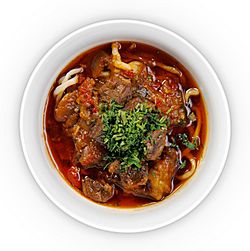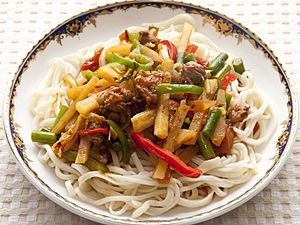Laghman (food) facts for kids

Uzbek lag'mon in Tashkent
|
|
| Alternative names | lagman, lag'mon, latiaozi |
|---|---|
| Type | Noodle soup |
| Place of origin | Central Asia |
| Region or state | Central Asia |
| Serving temperature | Hot |
| Main ingredients | noodles, meat broth, beef or lamb |

Laghman is a tasty dish from Central Asia and Uyghur cuisine. It's a type of noodle soup that includes meat, fresh vegetables, and special pulled noodles.
You might also hear Laghman called latiaozi or bànmiàn in Chinese. The word Laghman itself comes from the Chinese word lamian, which means "pulled noodles." Even though the name comes from Chinese, the way Laghman tastes and how it's made are very unique to Uyghur cooking. It's also a traditional meal for the Hui and Dungan people.
This dish is super popular in countries like Kazakhstan and Kyrgyzstan. It's even seen as a special national dish for the local Uyghur and Dungan communities there. You can also find Laghman enjoyed in Russia, Uzbekistan, Tajikistan, Turkmenistan, and parts of Afghanistan and Northern Pakistan. In Crimean Tatar cuisine, they also enjoy Laghman, having learned it from Uzbek culture.
How to Cook Laghman
Laghman is made with simple, fresh ingredients. The main parts are the meat, vegetables, and those special pulled noodles.
What Goes Into Laghman?
The meat used is usually lamb or beef. For vegetables, cooks often add colorful bell peppers, eggplants, radishes, potatoes, onions, and garlic. Many different spices are also used to give Laghman its unique and delicious flavor. In some places, like parts of Afghanistan, they even add chickpeas!
See also
 In Spanish: Laghman (comida) para niños
In Spanish: Laghman (comida) para niños
 | Dorothy Vaughan |
 | Charles Henry Turner |
 | Hildrus Poindexter |
 | Henry Cecil McBay |

